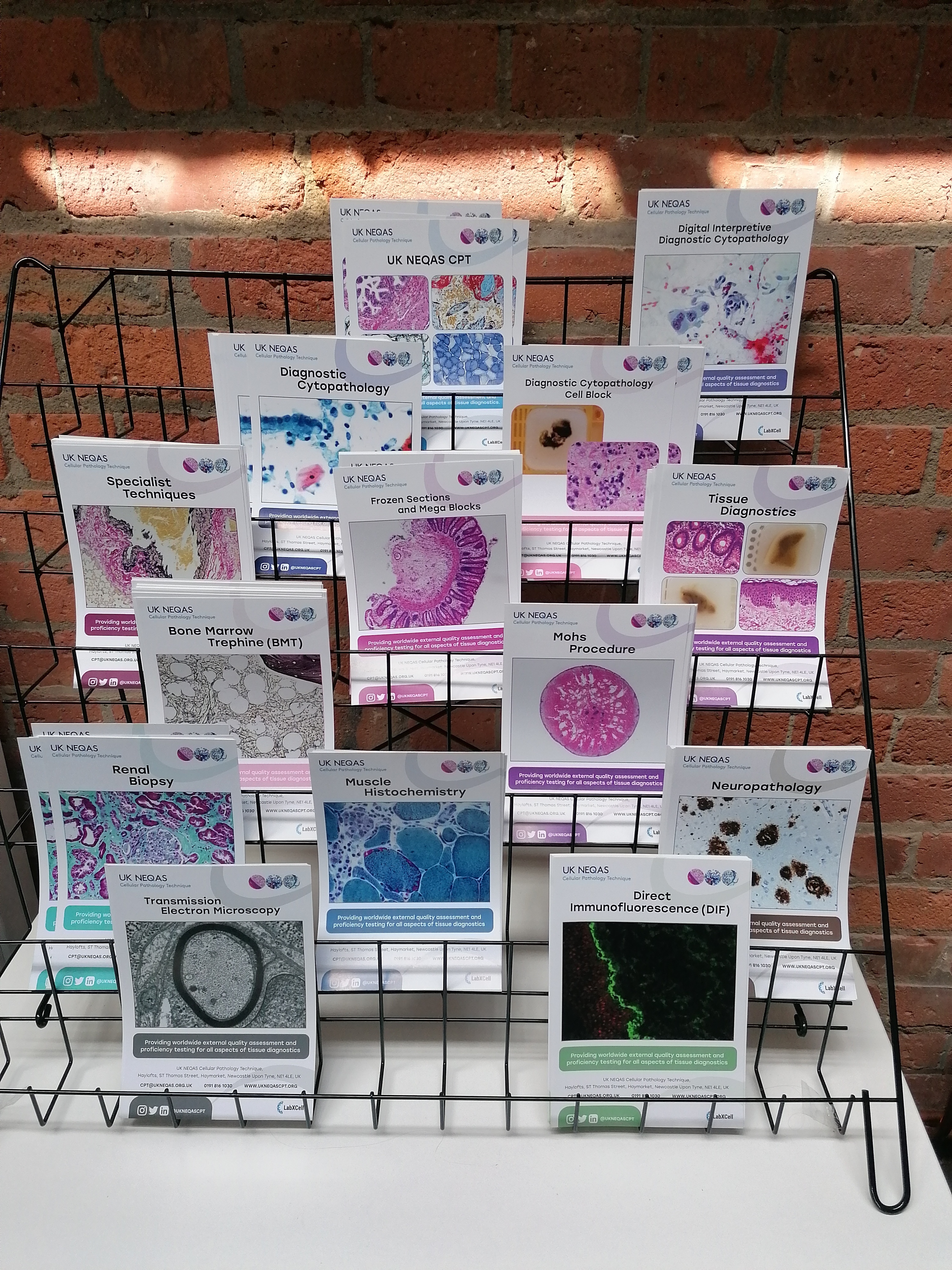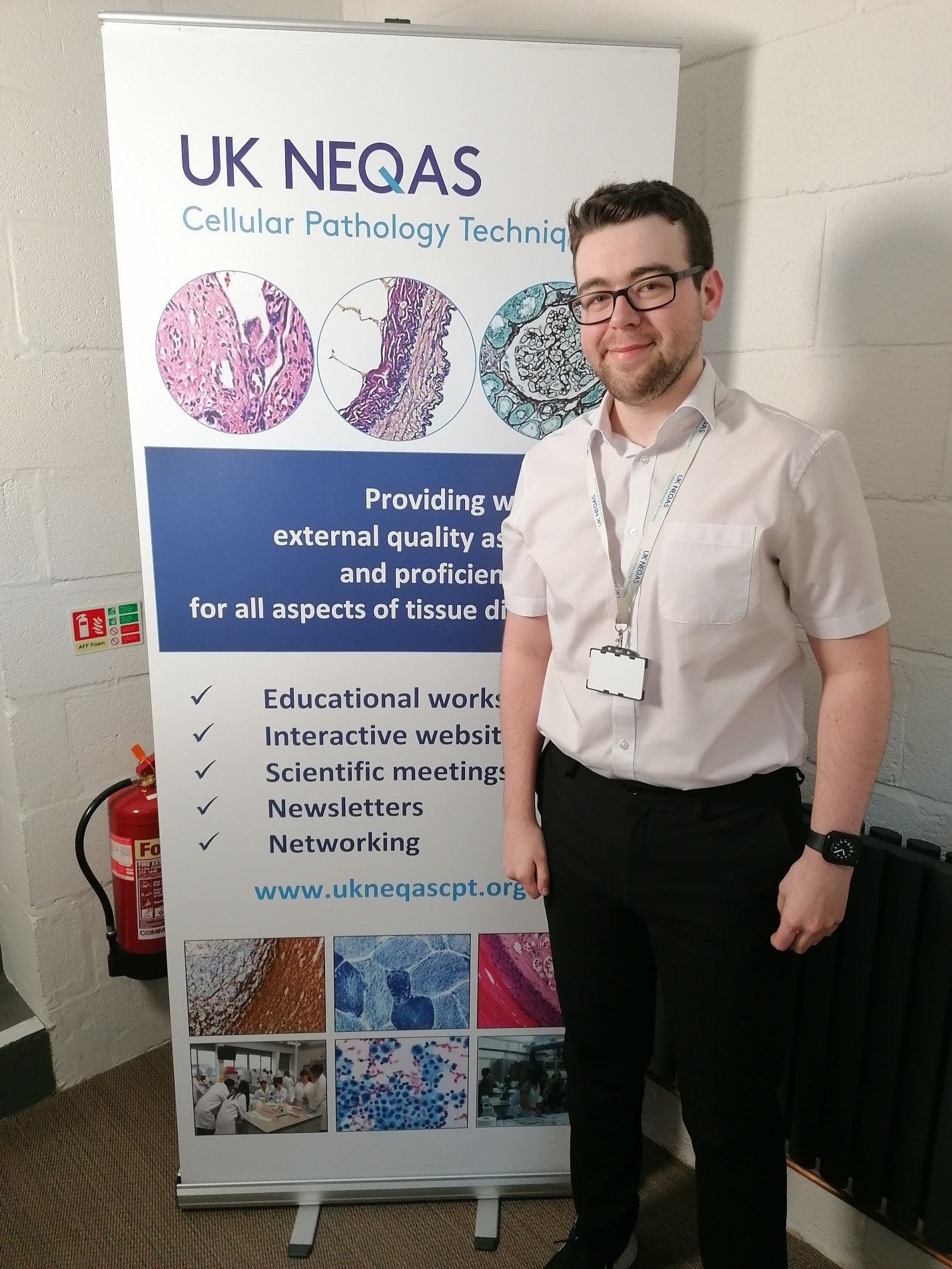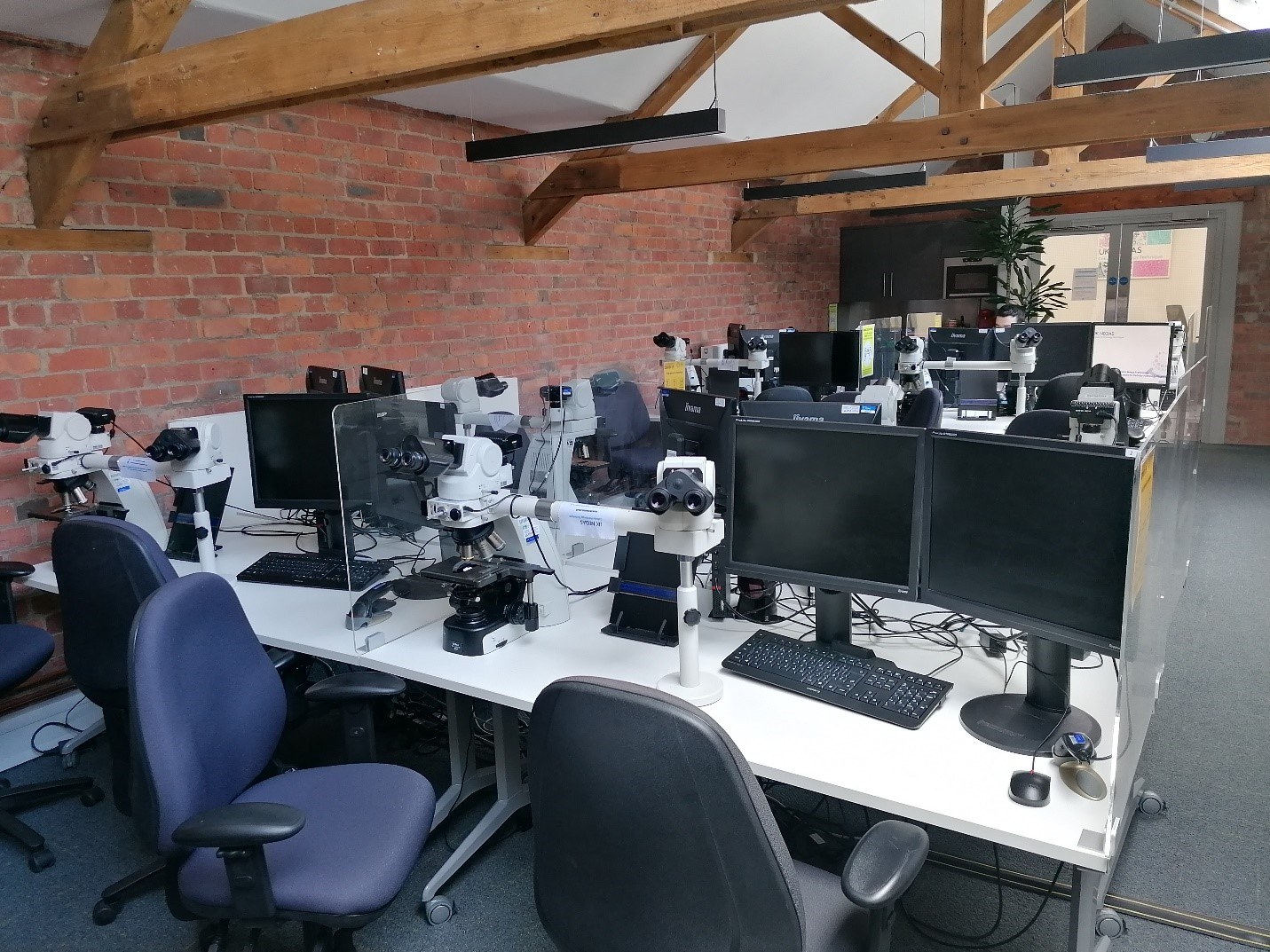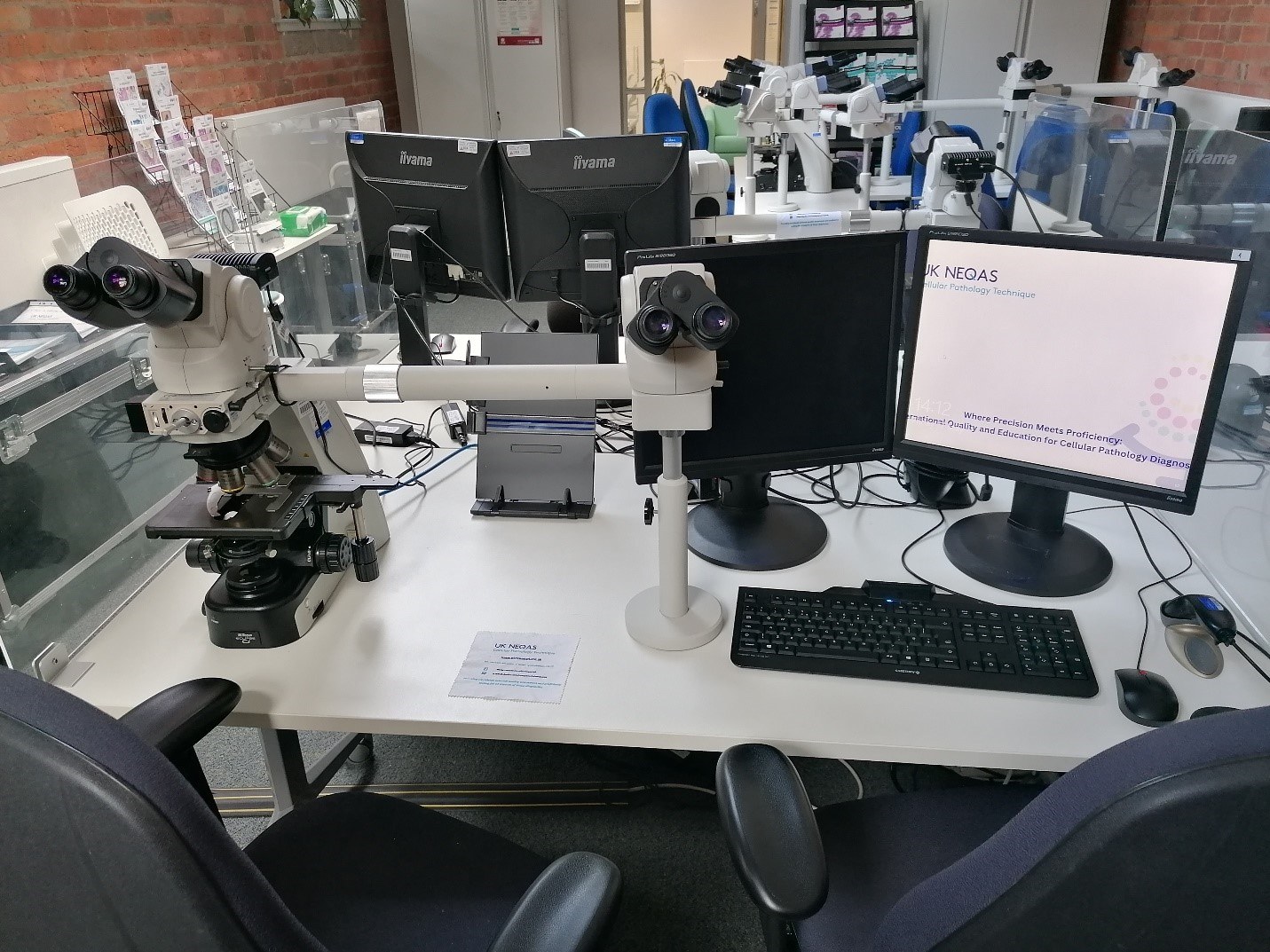Behind the Scenes of a UK NEQAS CPT Assessment Day
Donna Morrison - Advanced Biomedical Scientist, Newcastle Upon Tyne Hospitals NHS Foundation Trust and UK NEQAS CPT Assessor

United Kingdom National External Quality Assessment Service Cellular Pathology Technique (UK NEQAS CPT) are an organisation offering various quality assessment schemes for Cellular Pathology Techniques. Participating laboratories submit their archived diagnostic material for assessment or perform staining procedures on tissue supplied by UK NEQAS CPT. This serves as evidence of participating in a UKAS accredited quality assessment scheme as well as a method of monitoring the quality of our laboratory techniques. Depending on the repertoire within your laboratory you may participate in a variety of the schemes offered.

As an assessor for the Diagnostic Cytology scheme I’m going to give an overview of what a typical assessment day is like at UK NEQAS CPT as well as offer some of my own thoughts on the importance of quality in Diagnostic Cytology.
The UK NEQAS CPT Diagnostic Cytology scheme has six runs per year which asks participant’s to submit two specimen types. Serous fluid is included in each run with Head & Neck, Respiratory and Urinary Tract specimens being included twice a year.
If you are participating in the Diagnostic Cytology scheme you will know that you submit your slides by the run deadline and a few weeks later they arrive back at the lab with a score out of ten. Hopefully full marks, we do like to score a ten where deserved!
When the slides arrive at UK NEQAS CPT each are assigned a unique number and labelled. This anonymises them so that the submitting laboratories are not known to us and all slides are assessed without bias. By assessment day the UK NEQAS CPT team have all slides in order ready for us to begin scoring.


We arrive on site for 8.30am and begin with a brief opening meeting as the assessment co-ordinator goes over statistics from the previous run and highlights any issues and reminders we need to be aware of. We are given an outline of the day and any appeals and evaluations are brought to our attention.
We then proceed to a short multi-header session of previously scored slides to get our eye in and assessment hats on! Following this each assessor must complete a competency assessment consisting of a set of PAP and a set of MGG stained slides which are representative of the specimen types being assessed on that day; this must be passed before proceeding with assessments. We’re then ready to assess which we do in pairs with one driving while the other assessor completes the PC tasks, we swap throughout the day to prevent fatigue. Each assessor will score slides out of five, giving your slide it’s score out of ten.

All slides in the current run, appeals from the previous run and evaluations must be assessed by the end of the session so ideally 10-12 assessors are required for the day.
Slide fails are uncommon and some reasons such as sub-optimal staining or preparations may require some investigation in the laboratory via corrective and preventive actions (CAPA’s). Occasionally slides fail due to insufficient material for assessment which is easily avoidable. If this is something you have received then I would suggest the following:-
- Be familiar with the minimum requirement of cells of 50; if you are searching for cells and struggle to reach this number in a preparation the likelihood is that it is not suitable for assessment, you will stand a better chance of passing if there is adequate material on the slide to assess. In addition to this ensure the cells are the correct cell type relevant to the specimen i.e. we need to see mesothelial cells in serous fluids.
- The submission letter from UK NEQAS CPT requests your first adequate sample from a specified date – take those slides out of file and look at them down the microscope, if the slides do not meet the minimum criteria for assessment then look at your next sample. If there is nothing suitable from that date look at the dates around then, the day before and after. After all if you are submitting a urinary tract case and there were none on that date you would look to the days around the specified date. Another important point to note here is to make the distinction between diagnostic and technical adequacy; you may retrieve a slide that is diagnostically adequate but if it does not meet the specimen adequacy requirements of UK NEQAS CPT we cannot make an accurate assessment.
- Take a selection of slides out of file from that date and around it and look at them down the microscope as a team – this is an opportunity to create a quality culture and get everyone involved thinking about the quality of the samples we prepare in Cytology. We all know there are various methods to process cells onto a slide and technical skill and ability is involved at each step. The more all of the team are aware of the skills required to produce quality preparations and the reasons some can be sub-optimal the better for the samples, the slides, your laboratories UK NEQAS CPT results but ultimately the patient. The need to make good quality preparations first time is becoming ever increasingly crucial with the requirements for Cytology samples to go for ancillary testing. We want to get that diagnostic and technical quality in our slides to reduce the need for repeat preparations and therefore have as much of the remaining sample as possible available for the further testing required to direct treatment and provide prognostic information.
Assessment days are very busy and we can assess over 600 slides so it is definitely a day of work, not a day off work! However they are rewarding and some of the things I get out of being an assessor personally and professionally are:
- Making connections and networking with people from other laboratories in the UK and abroad
- Good practice sharing
- CPD/Professional activity/Benefit to your workplace
- Can be included in your professional portfolio/CV
- Exposure to different preparation types
- A sense of achievement knowing I am contributing to a renowned EQA scheme
If anyone is interested in the role of assessor feel free to contact me for more information or contact UK NEQAS CPT directly at cpt@ukneqas.org.uk.
Later this year UK NEQAS CPT will hold their Annual Participant Meeting on 4th and 5th November at America Square Conference Centre, London. Go to www.ukneqascpt.org/annual-participant-meeting-2024 for more information.
